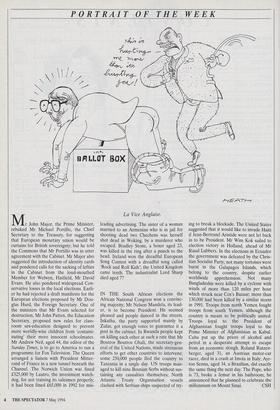PORTRAIT OF THE WEEK
La Vice Anglaise. Mr John Major, the Prime Minister, rebuked Mr Michael Portillo, the Chief Secretary to the Treasury, for suggesting that European monetary union would be curtains for British sovereignty; but he told the Commons that Mr Portillo was in utter agreement with the Cabinet. Mr Major also suggested the introduction of identity cards and pondered calls for the sacking of lefties in the Cabinet from the loud-mouthed Member for Welwyn, Hatfield, Mr David Evans. He also pondered widespread Con- servative losses in the local elections. Earli- er he had rejected a draft manifesto for the European elections proposed by Mr Dou- glas Hurd, the Foreign Secretary. One of the ministers that Mr Evans selected for destruction, Mr John Patten, the Education Secretary, proposed new rules for class- room sex-education designed to prevent more worldly-wise children from 'contami- nating' their more innocent schoolmates. Mr Andrew Neil, aged 44, the editor of the Sunday Times, is to go to America to run a programme for Fox Television. The Queen arranged a liaison with President Mitter- rand of France in a new tunnel beneath the Channel. The Norwich Union was fined £325,000 by Lautro, the investment watch- dog, for not training its salesmen properly; it had been fined £65,000 in 1992 for mis-
leading advertising. The sister of a woman married to an Armenian who is in jail for shooting dead two Chechens was herself shot dead in Woking, by a murderer who escaped. Bradley Stone, a boxer aged 23, was killed in the ring after a punch to the head. Ireland won the dreadful European Song Contest with a dreadful song called `Rock and Roll Kids'; the United Kingdom came tenth. The industrialist Lord Sharp died aged 77 IN THE South African elections the African National Congress won a convinc- ing majority; Mr Nelson Mandela, its lead- er, is to become President. He seemed pleased and people danced in the streets. lnkatha, the party supported mainly by Zulus, got enough votes to guarantee it a post in the cabinet. In Rwanda people kept on killing each other at such a rate that Mr Boutros Boutros Ghali, the secretary-gen- eral of the United Nations, made strenuous efforts to get other countries to intervene; some 250,000 people fled the country to Tanzania in a single day. UN troops man- aged to kill nine Bosnian Serbs without sus- taining any casualties themselves; North Atlantic Treaty Organisation vessels clashed with Serbian ships suspected of try-
ing to break a blockade. The United States suggested that it would like to invade Haiti if Jean-Bertrand Aristide were not let back in to be President. Mr Wim Kok sailed to election victory in Holland, ahead of Mr Ruud Lubbers. In the elections in Ecuador the government was defeated by the Chris- tian Socialist Party; not many tortoises were burnt in the Galapagos Islands, which belong to the country, despite earlier worldwide apprehension. Not many Bangladeshis were killed by a cyclone with winds of more than 120 miles per hour which struck near Cox's Bazaar; more than 130,000 had been killed by a similar storm in 1991. Troops from north Yemen fought troops from south Yemen, although the country is meant to be politically united. Troops loyal to the President of Afghanistan fought troops loyal to the Prime Minister of Afghanistan in Kabul. Cuba put up the prices of alcohol and petrol in a desperate attempt to escape from an economic slough. Roland Ratzen- berger, aged 31, an Austrian motor-car racer, died in a crash at Imola in Italy; Ayr- ton Senna, aged 34, a Brazilian, did exactly the same thing the next day. The Pope, who is 73, broke a femur in his bathroom; he announced that he planned to celebrate the
millennium on Mount Sinai. CSH


















































 Previous page
Previous page